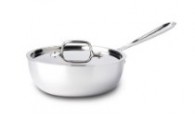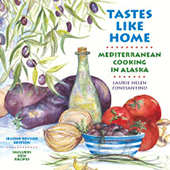My friend Salwa comes from Beit-jala, a small village just outside Bethlehem on the West Bank of the Jordan River. She came with her husband to Alaska, where they’re raising twin sons far from the violence that has disrupted the West Bank for too many years.
Salwa is an excellent cook. Interviewing Salwa and other church members was the highlight of writing Tastes Like Home: Mediterranean Cooking in Alaska. Tastes Like Home is a fundraiser for Holy Transfiguration Greek Orthodox Church, a pan-orthodox parish in Anchorage, Alaska.
We’re working hard to raise money for a new church building, necessary because we now hold services in a converted house far too small for our congregation. Weddings and funerals overwhelm our current building and must be held elsewhere. All proceeds from the sale of Tastes Like Home go directly into the Holy Transfiguration Building Fund.
Last month, we sold Tastes Like Home at the Anchorage Museum’s Book Fair. I staffed the booth with help from other church volunteers.
Salwa spent several hours helping out at the Book Fair. When we weren’t talking to customers, we were chatting about food. Salwa said she’d been thinking about bringing Palestinian Spinach Triangles to church the next day for coffee hour.
Palestinian Spinach Pies? My ears perked up. I asked if they were similar to Spanakopita (Greek Spinach Pies). Salwa said they were a similar shape, but used pita bread dough instead of filo for the wrapping, so weren’t loaded with butter. She said the filling was spiced with sumac and didn’t include cheese, so was suitable for religious fasting days or vegans.
I grabbed a pen and started taking notes. When I asked what the triangles were called, Salwa said “spinach in pita bread dough;” in Arabic, Sbanekh bil-Ajeen.
On the internet, I discovered a number of recipes similar to Salwa’s Spinach Pies, with names like Lebanese Spinach Pies (Fatayers), Spinach Turnovers (Fatayir bi Sabaanikh), and Savory Spinach Pies (Fataayer bis-sabaanigh). The different spellings are because Arabic, like Greek, isn’t consistently transliterated.
Sumac, the tart seasoning used to flavor Palestinian Spinach Pies, is used throughout the Middle East. It’s the dried and ground red berry of the sumac tree, and is sometimes sold mixed with salt. In cooking, sumac serves the same purpose as lemon or vinegar, but also adds a pleasing, fruity flavor.
In Anchorage, sumac is available at Sagaya and City Market. It is also found at Middle Eastern and gourmet markets or online from many vendors, including The Spice House, World Spice Merchants, and Penzeys.
Palestinian Spinach Pies took longer to make than I’d planned, but largely because it took me awhile to figure out how to shape them. Hopefully, the pictures set out below will make shaping the pies easier. It would be faster and easier to make larger pies than the hors d’oeurves size I made.
I brought the Palestinian Spinach Pies to a New Year’s Eve party, where they disappeared before 9 pm. They’re that good.





